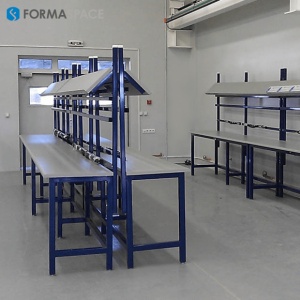
Shown above is a traditional drafting table with modern ergonomic features, such as full-height adjustment to reduce neck and back pain, as well as a large backlit worksurface that helps users make detailed revisions to large-scale drawings.
With Covid-19 vaccination rolling out, there is renewed optimism for economic growth. Find out which industries are poised to grow the fastest in 2021.
If we have learned anything over the past year, it’s to be prepared for the unexpected.”
AUSTIN, TEXAS, UNITED STATES, April 23, 2021 /EINPresswire.com/ -- CEO Confidence Highest Since 2004— Formaspace
Will the economy rebound in 2021?
Corporate executives seem to think so.
According to the news site Axios, over 80% of CEOs participating in the quarterly Conference Board business roundtable see improved economic conditions in the coming six months, the highest confidence level since 2004.
Corporate leaders point to the recent success of vaccination programs as a major reason for renewed optimism.
Interest rates are also exceptionally low, which has made it easier for businesses and governments alike to finance debts. Inflation also remains low, for now at least, in part thanks to a drop in energy prices. (More on the specter of a return to inflation later…) Many analysts also believe that the Federal Reserve isn’t getting enough credit for assisting the economy during the downturn in 2020, including providing ready capital for jittery markets.
One negative for exporters is that we are in a strong dollar environment. The dollar’s continued strength has been boosted by investors across the world seeking a safe haven during difficult economic times. While this makes purchasing imports cheaper for US consumers, it does hurts American companies, such as manufacturers, seeking to sell their products overseas.
Wall Street And Venture Capital Investors Anticipate High Growth Across The Board In 2021
The optimism of CEOs is shared by the stock market. Long seen as a leading economic indicator, the stock market has reached many new record highs this year.
Earlier this week, the Dow Jones Industrial Average closed at 33,527.19, a record high. The S&P 500 also hit a record closing high of 4,077.91, while the tech-heavy Nasdaq Composite climbed 1.7% to 13,705.59, not far off from its record high closing of 14,095.47 on February 12, 2021.
Can The Recent Gains In The Stock Market Help Us Identify Which Industries Will Grow The Most In 2021?
The short answer is no because investors are busy buying up just about everything on the markets, from companies that prospered during the pandemic – such as the Silicon Valley FAANG giants (Facebook, Amazon, Apple, Netflix, and Alphabet) — to stocks that were heavily battered by the pandemic, such as cruise lines.
If we were to pick one segment that stands out, it would be industries related to electrification, such as battery producers and electric car manufacturers or fintech stocks.
Take Tesla, for example. At times, its stock price has made the company more valuable than all the other car companies combined. Volkswagen has taken notice of this and has seen its stock price rise as it tries to mimic Tesla and become the Samsung in the market to compete with Tesla as Apple. (This metaphor will get too confusing down the road if the long-teased Apple electric vehicle ever comes to market.)
Despite an overall economic downturn, venture capital investment also remained strong during 2020, with M&A activity exceeding the levels of 2019. (Some analysts believe it may have already peaked.) As might be expected, many startup companies held back from launching IPOs during 2020, hoping for better returns once the economy rebounds. (VC investors are praying that the star-crossed IPO launch of the UK’s Deliveroo this past month is an exception, not the rule.)
2020 also saw the rise of SPACs (or Special Purpose Acquisition Companies) and their companion PIPE (Private Investment in Public Equity) funds, which have turned the traditional VC market on its head by allowing investors to raise capital first, then make startup company acquisitions later.
But the rise of unconventional investment vehicles, such as SPACs and PIPEs, has some analysts worried that there is too much money sloshing around trying to find good returns in today’s low-interest-rate environment. As further proof, they point to the case of Tesla, whose stock price far exceeds a reasonable price/earnings ratio, or to other current investing crazes, such as the meteoric rise of bitcoin and other cryptocurrencies, speculation in meme stocks like Gamestop, or the bizarre world of non-fungible tokens (NFTs), as evidence we could be in the midst of an “irrational exuberance” speculation bubble along the lines of the dot com era or even the Roaring Twenties.
Industries That Could Benefit From Government Stimulus Spending And Investments In Infrastructure And Green Technologies
The federal government is also pumping significant amounts of money into the economy.
The $1.9 trillion American Rescue Plan stimulus package passed earlier this year offers a lifeline to unemployed Americans as well as businesses in need (through the paycheck protection program) as well providing significant emergency financial aid to state and local governments.
But all eyes are on the Biden administration’s second act, the proposed $2 trillion American Jobs Plan, which – if passed in its present form – could dramatically change the economic prospects of many industry sectors.
Here are some of the key industry sectors which could see significant growth as a result:
· AEC Market (Architect, Engineering, Construction) Industry
The American Rescue Plan proposes to repair the country’s road infrastructure, retrofit or replace the nation’s 10,000 most dangerous bridges, as well as upgrading the top transportation choke points, including replacing transit tunnels in NYC and Washington DC. It also calls for significant infrastructure upgrades to passenger rail and transit systems, ports, and airports.
School construction would also spike under the plan, with extensive plans to modernize the nation’s K-12 school facilities, making them more environmentally sustainable.
The plan also proposes to upgrade Federal buildings (including the VA hospital system), which would also offer significant opportunities for the AEC industry.
· Healthcare
We mentioned upgrading VA facilities earlier, but there is more support in the bill for the healthcare industry, including increased funding for care homes for the elderly as well as support for enhanced child care for working families.
· Education
In addition to funding to modernize school buildings (see AEC bullet above), the bill would also fund new education initiatives to make education more accessible in disadvantaged areas.
· Research And Development
The proposed new legislation also proposes to significantly increase Federal financial support for R&D efforts through direct funding and more generous tax credits – a move that would provide a major boost to R&D laboratories. Dedicated funding will also support climate change research, including rare earth production, offshore wind energy production, carbon capture, and electric vehicles.
· Manufacturing Industry
The proposed new legislation would provide new support for the domestic manufacturing industry, including a preference for purchasing American-made goods in contracts financed by the legislation. This could result in a boon for manufacturers of raw materials such as concrete and steel, construction equipment, building materials, facility furnishings, HVAC equipment, as well as new transit and rail equipment.
Support for transitioning to electric vehicles (EVs) is also part of the plan, with financial support for additional American-made EV production, which will benefit traditional domestic vehicle manufacturers as well as new upstarts, such as the new Tesla competitor Lucid.
· Green Energy Technology
One of the major thrusts of the proposed legislation is to accelerate the shift to an environmentally friendly energy system. Suppliers of wind turbines (both on land and offshore), solar systems, battery storage systems, and other renewable energy sources would benefit greatly from the new proposed investments.
· Smart Grid Technology, Including EV Charging And Broadband Access
As the recent failure of the energy grid in Texas demonstrated, there is an urgent need to upgrade our energy supply grids. The American Jobs Plan act would fund the development of an upgraded smart electric grid, which would support renewable energy sources, as well as create a nation-wide network of charging point for EVs. The plan also funds the rollout of a high-speed broadband access network to provide data access across the country, especially in underserved rural areas.
The “Wildcard” Factors That Could Change The Fate Of Industries In 2021
If we have learned anything over the past year, it’s to be prepared for the unexpected. Here are a few “wildcard” factors that could dramatically change the outcome of different sectors of the economy in 2021:
· Tax Increases
If passed in its current incarnation, the $2 trillion American Jobs Act will require new revenue sources to pay for it. The current plan is to raise corporate taxes to 28% and increase the minimum tax on U.S. multinational corporations to 21%. (Fed chair Yellen has called for an international floor on corporate taxes to avoid a ‘race to the bottom.’)
There is considerable pushback to this idea, with some floating the idea of a carbon tax or a Tobin tax on financial transactions as an alternative.
Read more...
Julia Solodovnikova
Formaspace
+1 800-251-1505
email us here
Visit us on social media:
Facebook
Twitter
LinkedIn















